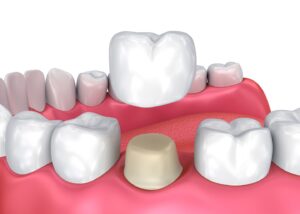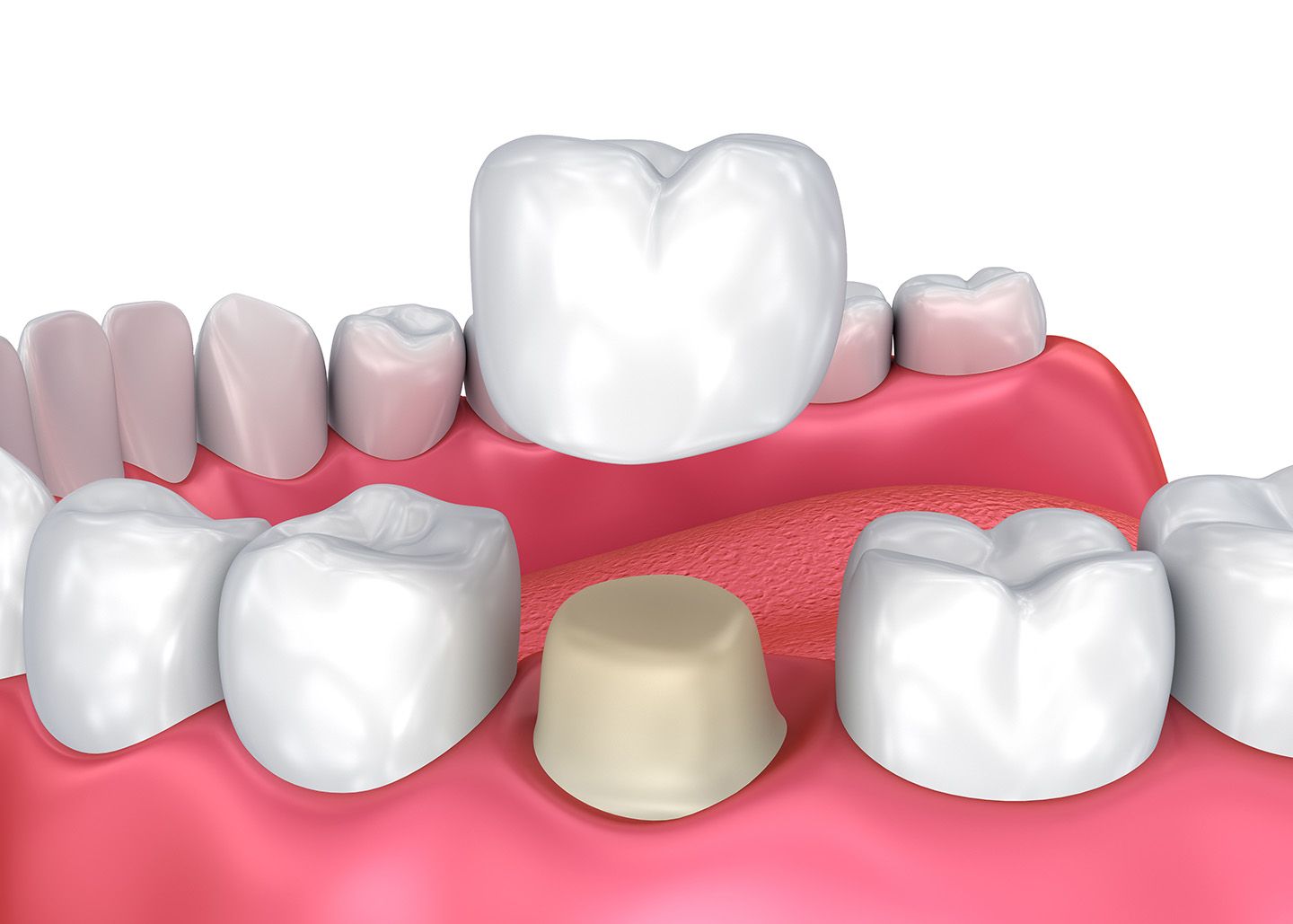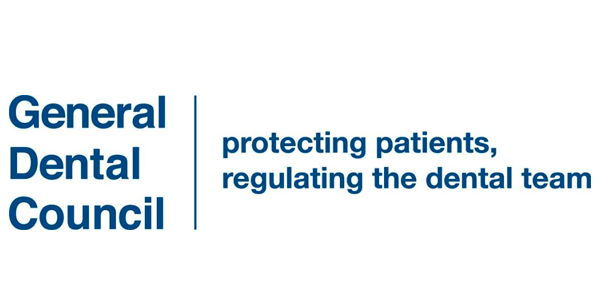What is a crown?
A dental crown is a “cap” that is placed over the tooth to restore its shape and size, strength, and improve appearance. Our in-house technicians perfectly match the crown to look like your other teeth, even down to the shading and grooves.
Once the crown is cemented into place this will function just like your other teeth. The crown lies at and above the gum line.

How long do Dental Crowns last?
On average, Dental Crowns last between 5 and 15 years. The life span of a crown depends on the amount of “wear and tear” the crown is exposed to. How well you follow good oral hygiene and actions such as grinding or clenching will all have an impact on the lifespan. If this is something you do, we can provide you with a clear mouthguard that you can wear during sleep to reduce the wear on your teeth. You should also avoid habits such as nail biting and opening items with your teeth.
Crown materials we use
Porcellin, zirconium and E-MAX crowns are all ceramic crowns which are the more preferable type of crowns due to their aesthetic appearance and better, more comfortable fit. All are durable, but can be more prone to cracking than metal crowns. Porcellian, Zirconium and E-MAX crowns are translucent in color, which ensures the closest color match to your natural teeth. Their color also eliminates the metal band around the gum line that is characteristic of ceramic metal mix crowns. Since they are made of ceramic, there is no risk of metal allergic reactions. Ceramic crowns are lighter and thinner than traditional ceramic metal mix crowns which means less of your tooth is required to be removed for the crowns to fit.
Emax Crowns are the most toughest crown and is less prone to chipping, however they are the most expensive material to use.
What steps are involved with the crown treatment?
There is normally 2 visits for the crown treatment.
- The first step involves the preparing of the tooth, scans and impressions.
- The second visit involves placement of the permanent crown.
The Preperation appointment
At the first visit in preparation for the crown, your dentist may take a few X-rays to check the roots of the tooth receiving the crown and surrounding bone. If the tooth has extensive decay or if there is a risk of infection or injury to the tooth’s pulp, a root canal treatment may first be performed.
Before the process of making a crown begins, your dentist will anaesthetise (numb) the tooth and the gum tissue surrounding the tooth. The tooth receiving the crown is reshaped along the biting surface and sides to make room for the crown.
After reshaping the tooth, your dentist will take a digital scan or sometimes use paste or putty to make an impression of the tooth receiving the crown. We will take Impressions of the upper and lower teeth to help us correct your bite if necessary and to also design match your crown to your other teeth. We will then make a temporary crown to cover and protect the prepared tooth while the crown is being made at our lab.
How should I care for my temporary crown?
Because temporary dental crowns are just a temporary fix we suggest a few precautions.
- Avoid sticky and hard foods on the area
- Keep the area clean with gentle flossing
Crown fit
We will remove the temporary crown and check the fit and shade of the new permanent crown. The permanent crown will not be fully cememented in until dentist and patient are both happy. If everything is well we will then, if needed, numb the area and cement the crown into place.
What Problems Could Develop With a Dental Crown?
Discomfort or sensitivity. Your newly crowned tooth may be sensitive after the procedure as the anesthetic begins to wear off. Your dentist may recommend that you brush teeth with a sensitive toothpaste. Pain or sensitivity that occurs when you bite down usually means that the crown is too high on the tooth. If this is the case, give us a call this is easily fixed.
Chipped crown. If the chip is small, a composite resin can be used to repair the chip with the crown remaining in your mouth. This is usually just a temporary fix. If the chipping is extensive, the crown may need to be replaced.
Loose crown. Sometimes the cement washes out from under the crown. Not only does this allow the crown to become loose, it also allows bacteria to leak in and cause decay to the tooth that remains. If a crown feels loose please contact reception to arrange an appointment.
Crown falls off. Sometimes crowns fall off. Reasons include; decaying of the underlying tooth and loosening of the cementing material used to place the crown. If your crown comes off please contact reception to arrange an appointment. We may be able to re-cement the crown in place; if not, a new crown will need to be made.
Aftercare
While a crowned tooth does not require any specific special care it does still require good oral hygiene including brushing twice a day and flossing daily.
Flossing is very important around the crown area.
Although the tooth is crowned this does not mean the tooth is protected from decay and gum disease.






